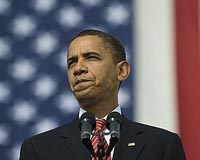| . |  |
. |
Port-Au-Prince (AFP) April 4, 2011 Michel Martelly, a carnival singer with a colorful past who seized the mantle of change, is Haiti's new president after storming to a landslide victory, preliminary results showed. The 50-year-old faces the huge challenge of rebuilding the Caribbean nation, which was the poorest country in the Americas even before a January 2010 earthquake flattened the capital Port-au-Prince and killed more than 225,000 people. Martelly, with 67.57 percent of the vote, ended the dreams of former first lady Mirlande Manigat, who was vying to become Haiti's first democratically elected female leader but finished with a disappointing 31.74 percent showing. The results, released late Monday by the electoral commission, are not final as a period of legal complaints must be observed until April 16. But with such a large margin, Martelly's victory seems all but assured. His supporters engaged in peaceful celebrations on the streets of the capital's Petionville area, though the US embassy reported gunfire from the festivities and urged its citizens to "stay indoors and avoid large crowds." Washington hailed the election results as an "important milestone" and urged Haitians to keep their demonstrations peaceful as the process moves forward. "Election-day accounts by Haitian and international observers uniformly reported that, while there were cases of irregularities and fraud on March 20, these cases were isolated and reduced, especially when compared to the first round of voting," the US embassy in Haiti said in a statement. It was an amazing turnaround for "Sweet Micky," who was knocked out of the race in December only to be reinstated a month later after international monitors found massive fraud in favor of the ruling party candidate. The bawdy entertainer was previously known for stripping and for ridiculing the government in satirical stage performances. But trading skirts for tailored suits, he led a slick campaign that captured the imagination of Haiti's urban youth, the main voting block in a country where the average age is just 21. He should now take office on May 14, after President Rene Preval, who has served the maximum of two terms allowed by Haiti's constitution, steps down. Martelly has promised to tackle Haiti's institutional failings and counter its dependency on NGO handouts. He has also indicated he is eager to bring back the military, disbanded in 1995 after a history of coups and abuse. More than 14 months after the earthquake, hundreds of thousands of survivors subsist in squalid tent cities, unemployment hovers around 50 percent and three in four Haitians live on less than $2 a day. After a perpetual cycle of political upheaval and natural disaster, the country of 10 million desperately needs to build viable institutions if it is to pull significant numbers out of poverty. The international community, which pledged some $10 billion in aid to help Haiti rebuild after the quake, has been reluctant to untie the purse strings until a peaceful transition of political power takes place. November's first round vote descended into farce as most of the 19 candidates demanded a new election before polls closed, accusing the ruling Unity party, Preval and the election commission of rigging the vote. At least five people were killed in December after Martelly was adjudged to have finished third behind Manigat and ruling party candidate Jude Celestin, meaning he had not made the run-off. After weeks of US-led pressure and a review by international monitors, Martelly was reinstated at the expense of Celestin, seen as Preval's handpicked successor. There had been calls to postpone the first round after Haiti's first cholera outbreak in more than a century erupted in mid-October, prompting deadly riots targeting UN peacekeepers blamed for bringing in the disease. Almost 4,800 people have since died, and with charities warning of an uptick in cases following heavy rainfall in late March, the health crisis will be one of the most pressing problems facing Martelly. Election squabbles were overshadowed in January by the shock return of former dictator Jean-Claude "Baby Doc" Duvalier, who is now under house arrest facing a slew of charges linked to his repressive 15-year rule. And then, just three days before the crucial March 20 run-off, Haiti's first democratically elected leader, Jean-Bertrand Aristide, returned from exile in South Africa. Aristide, a shantytown priest who rose to power as a champion of Haiti's predominantly Catholic poor, could have affected the result if he had endorsed one of the candidates. As it turned out, he honored a commitment not to upset the delicate political balance, but the presence of two giants of Haiti's scarred past is a potential powder keg for Martelly.
Share This Article With Planet Earth
Related Links Democracy in the 21st century at TerraDaily.com
 Obama turns to social media again for 2012 bid
Obama turns to social media again for 2012 bidWashington (AFP) April 4, 2011 US President Barack Obama launched his reelection campaign with a social media barrage Monday, turning once again to the online tools that helped propel him to the White House three years ago. Obama, 49, announced his 2012 candidacy with a message on Twitter, a status update on his Facebook page and an email blast to his millions of supporters, all of which provided a link to his BarackObama ... read more |
|
| The content herein, unless otherwise known to be public domain, are Copyright 1995-2010 - SpaceDaily. AFP and UPI Wire Stories are copyright Agence France-Presse and United Press International. ESA Portal Reports are copyright European Space Agency. All NASA sourced material is public domain. Additional copyrights may apply in whole or part to other bona fide parties. Advertising does not imply endorsement,agreement or approval of any opinions, statements or information provided by SpaceDaily on any Web page published or hosted by SpaceDaily. Privacy Statement |